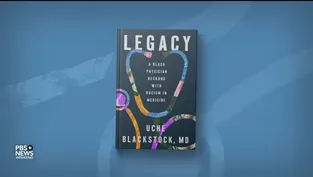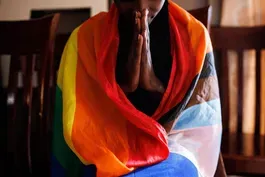
Montanans band together to save an iconic American landscape
Clip: 1/28/2024 | 5m 9sVideo has Closed Captions
How Montanans are banding together to preserve an iconic American landscape
In Montana, an unlikely group of allies is working together to preserve a unique prairie ecosystem, and at the same time, help their own rural economies. Montana PBS’s Stan Parker reports from one of the planet’s last remaining intact grasslands.
Problems with Closed Captions? Closed Captioning Feedback
Problems with Closed Captions? Closed Captioning Feedback
Major corporate funding for the PBS News Hour is provided by BDO, BNSF, Consumer Cellular, American Cruise Lines, and Raymond James. Funding for the PBS NewsHour Weekend is provided by...

Montanans band together to save an iconic American landscape
Clip: 1/28/2024 | 5m 9sVideo has Closed Captions
In Montana, an unlikely group of allies is working together to preserve a unique prairie ecosystem, and at the same time, help their own rural economies. Montana PBS’s Stan Parker reports from one of the planet’s last remaining intact grasslands.
Problems with Closed Captions? Closed Captioning Feedback
How to Watch PBS News Hour
PBS News Hour is available to stream on pbs.org and the free PBS App, available on iPhone, Apple TV, Android TV, Android smartphones, Amazon Fire TV, Amazon Fire Tablet, Roku, Samsung Smart TV, and Vizio.
Providing Support for PBS.org
Learn Moreabout PBS online sponsorshipa unique prairie ecosystem and at the same time# their work is helping their own rural economies Stan Parker of Montana PBS takes us to one of# the planet's last remaining intact grasslands.
STAN PARKER (voice-over): In central Montana,## family ranchers are stepping BILL MILTON, Rancher: This is one of the last# really great intact grasslands left in the world.
ALEXIS BONOGOFSKY, Sustainable Ranching# Initiative: Grasslands provide habitat for## hundreds of wildlife species that need# this p STAN PARKER (voice-over): For ranchers like the# Nolans, grassland conservation is about survival.
LAURA NOLAN, Rancher: What it comes down to# is if we're not taking good care of the land,## we're not going to be here anymore.
STAN PARKER (voice-over): On a ho Jack and Anna, are tearing out# some old fences.
They'll replace## them with a different type that allows# migrating animals to pass through safely.
LAURA NOLAN: So the bottom wire is# high enough for antelope to go under,## and then the top wire is low enough for# the deer and the elk to go over.
And then## there's a space between the first and second# wires that the sage grouse can go through.
STAN PARKER (voice-over): The federal# government is helping pay for this## project.
It's one example of a conserva years.
Major environmental nonprofits and# government agencies are expanding financial## incentives to help family ranchers# protect this vast grassland ecosystem.
With a population under 200, the small town of# Winnett is playing an outsized role in this work,## thanks in large part to a local group# called ACES, or agricultural community## enhancement and sustainability.
Laura# Nolan helped start the organization.
LAURA NOLAN: In a nutshell, Aces is a group# of people who care about Winnett specifically.## But central Montana more broadly and# rural communities even more broadly.
STAN PARKER (voice-over): The group# makes conservation projects like this## stream restoration possible by linking# local ranchers with fu volunteer labor.
And the work comes with some# unexpected alliances, says rancher Bill Milton.
BILL MILTON: 20, 30 years ago, a group like# the Nature Conservancy or World Wildlife Fund## or Audubon, these are traditionally# perceived by ranchers as the enemy.
LAURA NOLAN: Those were organizations## definitely that we fea STAN PARKER (voice-over):# Today, their goals are aligned.
BILL MILTON: Over time the sort of mainstream# en ground that supports this wildlife is privately# owned.
So if you're in a conflict with a person## who's providing most of the habitat for what you# think is important, you either got to beat them,## put them out of business, turn it all into a# park, or you have to form an alliance with them.
LAURA NOLAN: We've met a lot of traditional and## non-traditional partners in# this adventure that we're on.
ALEXIS BONOGOFSKY: I think people# sometimes are surprised that World## Wildlife Fund has a program# that works with ranchers STAN PARKER (voice-over): Alexis# Bonogofsky raises sheep near billings and she manages the Sustainable Ranching# Initiative for World Wildlif ALEXIS BONOGOFSKY: If a rancher wants# to change their grazing practices to,## for example, give more rest to a# certain area on their ranch every year,## then World Wildlife Fund is able to help them# with infrastructure costs to make that possible.
LAURA NOLAN: We're all kind of meeting in the# middle here because we do have these common## goals.
And part of that, too, is we have to not# always be so defensive as ranchers and landowners,## too.
And we can improve what we're doing.# And we should improve where we can.
STAN PARKER (voice-over): These# ranchers and wildlife organizations## are also working together to help the# AL EXIS BONOGOFSKY: We know that# supporting these communities and## the work that they're doing is the only# way we will Plains ecosystem.
The conservation work# isn't separate from the community work.
BILL MILTON: And it demonstrates# to people who are still, I think,## in the ranch community a little bit of scant.# Like, well, I don't trust these guys.
In the end,## they're really coming out to get us.
And I just# don't believe that anymore because the evidence## of people's actions are a lot more credible than# people's projections of what they think they are.
STAN PARKER (voice-over):# One of those team efforts,## restoring a historic building on Main turning it into an ice cream parlor, coffee# shop, ap BILL MILTON: We all know that rural America in# many places has been struggling, and I think we're## finding that don't wait for some white horse# to come galloping over the ridge to help you.## If you want to create something better, you're# going to have to take a role in creating that.
STAN PARKER (voice-over): For PBS News# Weekend, I'm Stan Parker in Winnett, Montana.
A Black physician’s memoir details medical racism in America
Video has Closed Captions
Clip: 1/28/2024 | 5m 58s | A Black physician’s memoir looks at the legacy of medical racism in America (5m 58s)
LGBTQ Ugandans fight to survive under country’s anti-gay law
Video has Closed Captions
Clip: 1/28/2024 | 8m 36s | LGBTQ+ Ugandans fight for survival, civil rights under country’s anti-gay law (8m 36s)
Providing Support for PBS.org
Learn Moreabout PBS online sponsorshipSupport for PBS provided by:
Major corporate funding for the PBS News Hour is provided by BDO, BNSF, Consumer Cellular, American Cruise Lines, and Raymond James. Funding for the PBS NewsHour Weekend is provided by...













